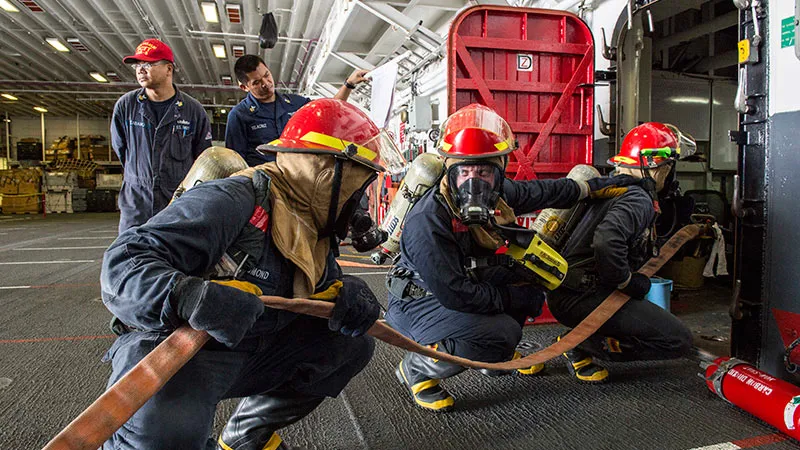-
CENTRES
Progammes & Centres
Location
A continued focus on training and development of a methodology that includes a realistic approach to human rights terms and principles is needed.

Earlier this year, India's Defence Minister Manohar Parrikar's delivered insightful comments at the Shangri-La Dialogue that focused principally on the blue economy, security, and collaboration. His remarks underscored the complexity of responding to terrorist, asymmetric, and criminal maritime threats. Indeed, an additional layer of complexity is emerging, as judges increasingly interpret and apply human rights principles in criminal prosecutions of maritime criminals. Now, more than ever, detention conditions, transit times to port for warships transporting suspects, and the use of force are being looked at through a human rights prism.
In the most recent edition of the Stanford Journal of International Law, my paper examines why the number of legal opinions in the past five years involving human rights and maritime law enforcement eclipses any other period; the absence of a uniformly recognised approach, and why the growing gap between humanitarian considerations and law-enforcement practices represents an urgent focus area.
The article discusses issues of importance to policymakers, military commanders, and jurists over the next decade, seeking to provide a roadmap for a consistent approach to upholding human rights while ensuring that those who commit criminal and terrorist acts on the water are held legally accountable.
Three European cases are emblematic of the current challenge of human rights at sea unfolding globally. In 2009, German Special Forces rescued mariners aboard a hijacked cargo ship and detained ten suspected pirates. Subsequently, a transfer arrangement was diplomatically brokered in which the pirates were delivered from German custody to Kenya. In another case in 2010, the Dutch Navy transported five suspected Somali pirates to Rotterdam for prosecution. The same year, the French Navy interdicted drug traffickers operating off the African coast carrying 3.2 tons of cocaine. In all three instances, courts found government responses violated the suspects' human rights.
A study of these cases reveals that a prominent legal — and policy — issue today is how to judiciously apply legal instruments that were largely developed before expanded maritime law enforcement operations. Human rights concepts with application in the maritime environment include deprivation of liberty, due process, promptness, wholly exceptional circumstances, humane treatment, the right to life, and non-refoulement. Human rights law resides in multiple documents, including the Universal Declaration of Human Rights, the Convention Relating to the Status of Refugees, and the International Covenant on Civil and Political Rights, among others.
National-level authorities complement international law on human rights. In India, for instance, the Constitution and the Protection of Human Rights Act, 1993, as amended, represent seminal authorities. The Indian Maritime Security Strategy (2015) also discusses human rights, noting, "the modern idea of human rights and social security is in consonance with.. traditional Indian thoughts."
While many of these cases involve India and Indian interests (as well as from Europe, Africa, North America, Australia, and Asia), there is the fundamental question of whether human rights apply on the water. The answer is provided by the International Tribunal for the Law of the Sea in M/V Saiga, and affirmed in the "Enrica Lexie" Incident (Italy v. India), that "Considerations of humanity must apply in the Law of the Sea as they do in other areas of international law."
This does not resolve the contested issue of whether there must be a certain age at which a minor can be held criminally responsible for their actions. A case in point is the Indian Navy's successful interdiction in 2012 of 61 pirates, of which 25 were not even 15 and at least four of whom were estimated to be approximately 11 years old. Besides, there is a body of mixed judicial opinion on transit times, or time limits, when transporting drug traffickers and pirates aboard government vessels. The debate over whether authorities surrounding a coastal state may impose confinement as a penalty for fisheries laws violations or intentionally sink a vessel, too remains unsettled.
Maritime law enforcement takes place in a unique operating space. The maritime texts enshrine concepts such freedom of the seas and the general principle of flag state jurisdiction. The terms for maritime zones are also unique, and include the territorial sea, contiguous zone, exclusive economic zone, and the high seas. Additional unique elements in maritime law enforcement include potentially interdicting suspected traffickers far from shore and without backup support, conducting boardings in challenging weather and volatile environmental conditions, and engagements that are inherently dangerous.
Against this complex backdrop, there has been a growing propensity of courts to address issues once considered the preserve of government officials and operational commanders. It has resulted in an ad hoc collection of judicial opinions, treaties, and multilateral agreements, lacking coherence and consistency. Uncertainty impacts the capability of naval and coast guard operations, and more broadly, maritime security. If States are unable to prosecute suspects apprehended at sea, or risk human rights breaches because of an unnecessarily rigid judicial approach, the potential increases for criminals and terrorists to conduct illicit activities with impunity.
As a consequence of present day maritime policing practices, the future is likely to witness a significant rise in the number of issues being addressed in courtrooms. Judges may be called upon to adjudicate on whether there is a right to privacy on the high seas; the collection and storage of biometrics; and the conduct of privately contracted armed security personnel. The key imperative for the maritime legal community is to harmonse human rights with law enforcement measures. This challenging issue warrants continued focus, training, and the development of a methodology that includes a realistic approach to human rights terms and principles.
The views expressed above belong to the author(s). ORF research and analyses now available on Telegram! Click here to access our curated content — blogs, longforms and interviews.

Brian Wilson US Navy (Retired) is the Deputy Director of the US Global Maritime Operational Threat Response Coordination Center (GMCC). In addition to being the ...
Read More +